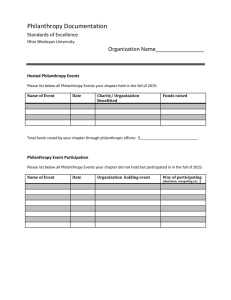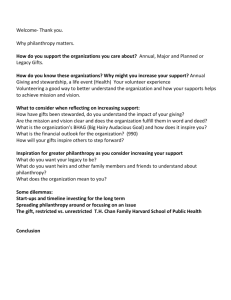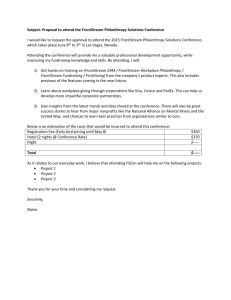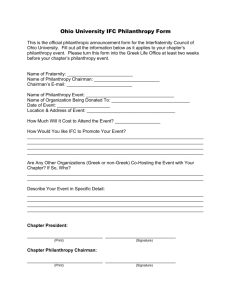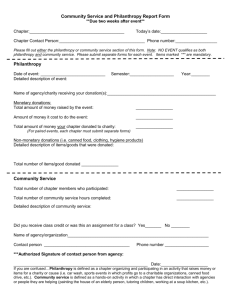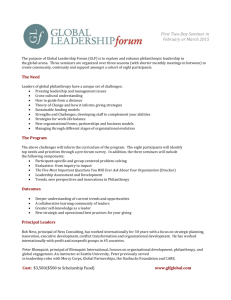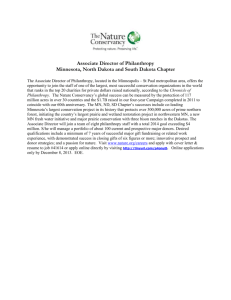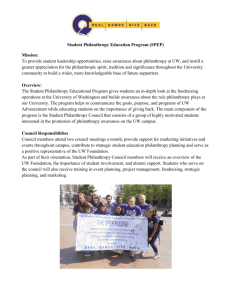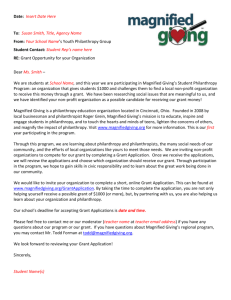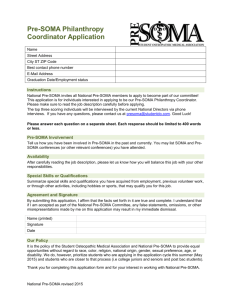Course Materials
advertisement
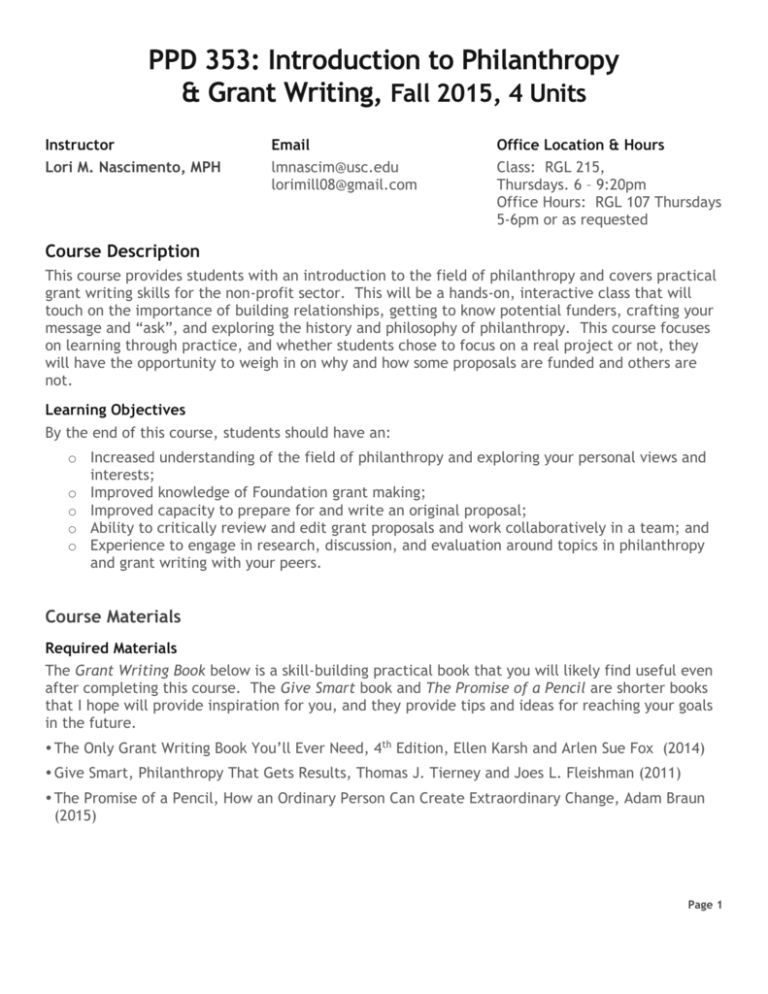
PPD 353: Introduction to Philanthropy & Grant Writing, Fall 2015, 4 Units Instructor Lori M. Nascimento, MPH Email lmnascim@usc.edu lorimill08@gmail.com Office Location & Hours Class: RGL 215, Thursdays. 6 – 9:20pm Office Hours: RGL 107 Thursdays 5-6pm or as requested Course Description This course provides students with an introduction to the field of philanthropy and covers practical grant writing skills for the non-profit sector. This will be a hands-on, interactive class that will touch on the importance of building relationships, getting to know potential funders, crafting your message and “ask”, and exploring the history and philosophy of philanthropy. This course focuses on learning through practice, and whether students chose to focus on a real project or not, they will have the opportunity to weigh in on why and how some proposals are funded and others are not. Learning Objectives By the end of this course, students should have an: o Increased understanding of the field of philanthropy and exploring your personal views and interests; o Improved knowledge of Foundation grant making; o Improved capacity to prepare for and write an original proposal; o Ability to critically review and edit grant proposals and work collaboratively in a team; and o Experience to engage in research, discussion, and evaluation around topics in philanthropy and grant writing with your peers. Course Materials Required Materials The Grant Writing Book below is a skill-building practical book that you will likely find useful even after completing this course. The Give Smart book and The Promise of a Pencil are shorter books that I hope will provide inspiration for you, and they provide tips and ideas for reaching your goals in the future. The Only Grant Writing Book You’ll Ever Need, 4th Edition, Ellen Karsh and Arlen Sue Fox (2014) Give Smart, Philanthropy That Gets Results, Thomas J. Tierney and Joes L. Fleishman (2011) The Promise of a Pencil, How an Ordinary Person Can Create Extraordinary Change, Adam Braun (2015) Page 1 Optional Materials and Resources You want to learn more about this topic? If so, I’m listing another book and several websites that you may find useful for this class and beyond. Philanthropy in America, A History, by Olivier Zunz (2012) The Foundation by Joel Fleishman (2009) Foundation Center Online o www.foundationcenter.org The Grantsmanship Center o www.tgci.com Grant Makers for Effective Organizations (GEO) o www.geofunders.org Grants-Gov: o Http:/www.grants.gov Federal Register o www.federalregister.gov Course Format and Student Expectations This course meets once per week. Attendance and participation are mandatory. The expectation is to discuss the reading assignments and apply them to class projects. The classes are intended to be interactive so that students and the instructor can learn from each other. Students will spend a significant amount of time working in smaller groups to develop, discuss, create and critique grant writing assignments. We will read about and discuss theoretical concepts about philanthropy for the first few weeks, and then we will more into proposal writing skills. The intention is for students to hear various perspectives of philanthropy, which will help shape one’s own opinions. Then, consider what topic, field, or organization you would like to represent and use your interests and passion to write a compelling grant proposal. There will be a greater focus on foundation grants rather than large governmental grants for this course. If you would like to speak with the instructor before class or at another time, please ask the instructor in advance to arrange a time that accommodates everyone. The syllabus will serve as a guide for this course; however, as needed, some topics and assignments may be adjusted to accommodate the dynamic nature of the course. Classroom discussions and student interests and experiences may lead to necessary adjustments along the way to ensure that the course supports the highest level of learning and productivity. Statement for Students with Disabilities Any student requesting academic accommodations based on a disability is required to register with Disability Services and Programs (DSP) each semester. A letter of verification for approved accommodations can be obtained from DSP. Please be sure the letter is delivered to me as early in the semester as possible. DSP is located in STU 301 and is open 8:30 a.m.–5:00 p.m., Monday through Friday. Website and contact information for DSP: http://sait.usc.edu/academicsupport/centerprograms/dsp/home_index.html, (213) 740-0776 (Phone), (213) 740-6948 (TDD only), (213) 740-8216 (FAX) ability@usc.edu. Page 2 Statement on Academic Integrity USC seeks to maintain an optimal learning environment. General principles of academic honesty include the concept of respect for the intellectual property of others, the expectation that individual work will be submitted unless otherwise allowed by an instructor, and the obligations both to protect one’s own academic work from misuse by others as well as to avoid using another’s work as one’s own. All students are expected to understand and abide by these principles. SCampus, the Student Guidebook, (www.usc.edu/scampus or http://scampus.usc.edu) contains the University Student Conduct Code (see University Governance, Section 11.00), while the recommended sanctions are located in Appendix A. Emergency Preparedness/Course Continuity in a Crisis In case of a declared emergency if travel to campus is not feasible, USC executive leadership will announce an electronic way for instructors to teach students in their residence halls or homes using a combination of Blackboard, teleconferencing, and other technologies. Grading This course provides traditional letter grades, determined by a combination of in-class activities, participation, assignments, exams and projects. More details on each assignment will be provided in separate PPD 353 Grading Sheets. Class Participation 15% Class Projects 25% Grant Project 40% Mid-term 10% Final Exam 10% GRADE DISTRIBUTION TABLE A A- 93 – 100% 90 – 92% B+ B B- 88 - 89% 83 - 87% 80 - 82% C+ C C- 78 - 79% 73 - 77% 70 - 72% D+ D D- 68 - 69% 63 - 67% 60 - 62% F 59 - 0% Page 3 Course Schedule* *This schedule is subject to change based on class dynamics. Week 1. Aug. 27th Topic Reading to do for Following Week Exercises and Homework Introductions Promise of a Pencil Read chapters 1 - 8 Exploring Philanthropy The Promise of a Pencil Read chapters 8 – 10 Types of Funders and Support Grant Writing Book Read pages 1 – 13 Course Overview Topics in Philanthropy 2. Sept. 3rd Overview of Class Project #1 3. Sept. 10th Start Personal “What is Philanthropy” project (CLASS PROJECT #1) CLASS PROJECT #1 DUE - Student Presentations of “What is Philanthropy? Discuss Promise of a Pencil Complete The Promise of Complete Promise of a Pencil Book, a Pencil and discuss read discussion questions and be ready to answer questions 1, 2, 6, and 12 Consider your passions and interest regarding purpose-driven work. Strategic grant writing Grant Writing Book Introduction to Grant Writing Read Lesson 2 Components of Grant Writing 4. Sept. 17th Discuss Questions from Promise of a Pencil Give Smart Read pages 1 – 48 Grant Writing Book Read Lessons 3 and 4 Strategic Philanthropy Getting Ready for Grant Writing Start “Inspiring Philanthropist” project (CLASS PROJECT #2) Overview of Class Project #2 – Identify and present about an inspiring philanthropist 5. Sept. 24th CLASS PROJECT #2 DUE - Student presentations of “Inspiring Philanthropist” projects Begin research for your grant writing project Grant Writing Book Read Lesson 5 Identifying your project/NGO Give Smart Read Chapter 2 Letter of Inquiry Aligning mission with request Begin Research for a topic Building Relationships Self-guided research on your grant topic Page 4 Week Reading to do for Following Week Topic Overview of Class Project #3 Assignment – research issues and identify questions 6. Oct. 1st Oct. 8th Start CLASS PROJECT #3 – summary of research on grant topic, questions for your peers CLASS PROJECT #3 DUE – Brief research summaries on research topics followed by Q and A with peers Grant Writing Book Read Lessons 6, 7, 8 Discuss Class Project #2 - Share your independent research on grant topic with class Give Smart Read Chapter 3 Writing your grant Grant Writing Book Read Lessons 9, 10, 11, 12, 13, 14 Grant Writing Skills 7. Exercises and Homework Goals and Objectives Write 5 questions you have regarding grant-writing? Developing your Budget and Budget Narrative Get assignment for the Midterm 8. Oct. 15th MIDTERM Field Work Guidelines TBD based on projects Prepare for field work Overview of Class Project #4 9. Oct. 22nd FIELD WORK – Visit organizations and/or events in your topic area - 10. Oct. 29th CLASS PROJECT #4 - Write a 2-page paper on your field work experience as per the guidelines (to be distributed by October 8th) Who are you representing? Why is this grant necessary? What are you asking for? Where are you going to send your proposal? CLASS PROJECT #4 Due – share your field work experiences with the class Share field work experiences with class, what you learned, challenges, surprises and next steps Q and A 11. Nov. 5th Voices from the Field Guest speakers share about grant writing and grant processing 12. Nov. 12th Proposal element review and Q and A with Instructor Grant Writing Book and Revise elements of your proposal as per other resources, peer and instructor suggestions depending on your project 13. Nov. 19th Evaluation and Reporting Grant Writing Book and other resources (to be shared in class) Work on your proposal, including the cover letter, rationale, context, request, work plan, evaluation, sustainability plan, budget and other necessary elements Finalize proposal, plans for submission and reporting. Prepare final proposal to submit with on Dec. 3rd, when group presentations are due. Page 5 Week Topic Reading to do for Following Week Exercises and Homework 14. Nov. 26th NO CLASS – Happy Thanksgiving Work on proposals and final presentation 15. Dec. 3rd Group Presentations Receive final exam instructions and review readings 16. Dec. 10th FINAL EXAM Complete final exam and course evaluations Careers in Philanthropy and Grant Writing Page 6
